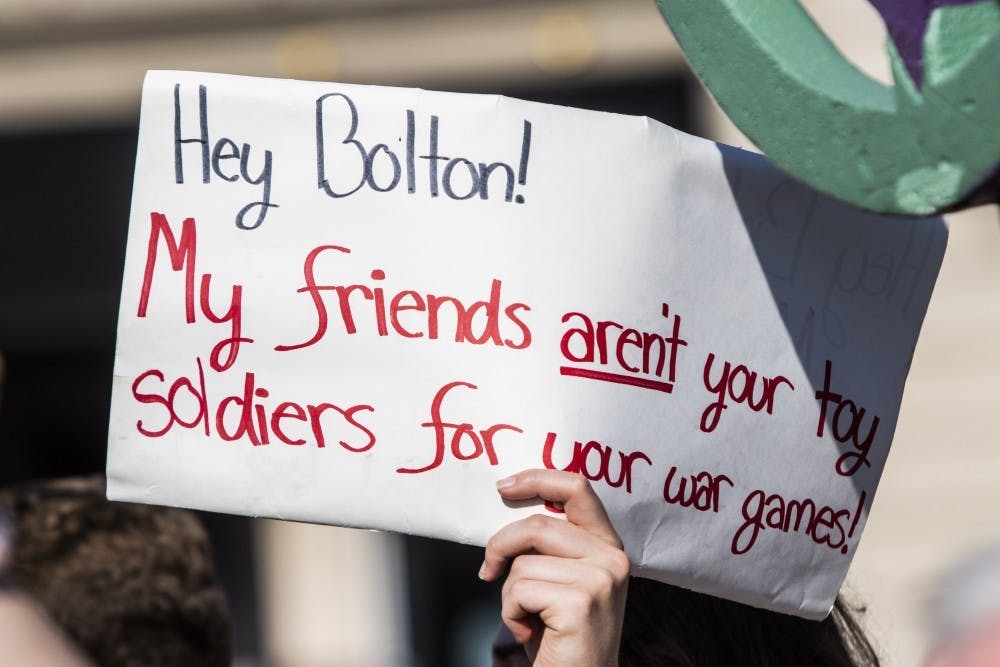President Donald Trump is still misleading the public about Iran more than two weeks after he brought the country to the brink of war by ordering the assassination of Iranian General Qasem Soleimani.
After Iran retaliated on Jan. 7 by firing missiles at two Iraqi bases that housed American service members Jan. 8, the Trump administration asserted there were no American casualties in the strikes. This was repeated uncritically by several media outlets.
We now know that 11 people had to be evacuated from Iraq due to serious injuries, including concussions. Trump tried again to minimize the injuries Wednesday by calling them “not very serious.”
In retrospect, the mainstream discussion around the strike showed that much of the press accepted several assumptions and premises that limited necessary discussions about U.S. imperialism.
Liberals in the media criticized Trump for calling the strike without congressional approval, but most often blunted the criticism by implying that Soleimani deserved to die. For example, MSNBC’s Brian Williams called him a "bona fide bad guy" while describing the assassination. Much of the administration’s lines were repeated uncritically, and important context of the U.S.-Iran relationship was left out of the discussion.
Many Democrats criticized Trump’s exit of the 2015 Iran nuclear deal, yet few in the media brought up the fact that Democrats voted in support of violating the agreement by adding new sanctions, and then voted to increase Trump’s military budget.
Part of the administration’s justification for the assassination was the alleged “imminent threat” to U.S. forces in the region. Mainstream news outlets elevated these claims without qualification, even after calling out the administration’s dishonesty for years. Later, Secretary of State Mike Pompeo redefined the word “imminent” to mean “this was gonna happen,” but said he didn’t know where or when. Trump later pointed out that whether or not an attack was imminent “doesn’t really matter” because Soleimani was a terrorist.
Defining an individual or organization as “terrorist” has been a winning strategy for those who wish to justify using America’s military. No one wants to be labeled “soft on terrorism.” In the Soleimani coverage, this framing was used repeatedly. CNN Anchor Jake Tapper tweeted that “It turns out plenty of Iranians loathed Soleimani [and] opposed the terrorism he spread.” Democratic Primary candidate Joe Biden asserted that Soleimani deserved to be killed. Other candidates repeated that Soleimani was responsible for American deaths.
Most who ignore the fact that the deaths happened in the context of the invasion of Iraq, an illegal war of aggression. If the press were honest about the use of the term, then former President George W. Bush would deserve the designation “terrorist” many times over. Does this mean Trump should have assassinated the former president as well?
One of the most egregious ongoing media errors when covering Iran is the lack of context. Nearly all of the pundits discussed the 2015 Iran nuclear deal as the center of the current situation in Iran. In the short term, this is accurate. However, we cannot talk seriously about the U.S. relationship with Iran without going back nearly 70 years.
In 1953, the U.S. overthrew the first democratically elected Iranian president and installed a brutal dictator. In the years after the Iranian people overthrew the dictator, the U.S. began a regime of both economic and conventional warfare. In the years since, the U.S. ended up with dozens of military bases encircling Iran. Throughout this entire period, Iran has labored under crushing sanctions.
The idea that Iran may be defending itself and its interests seems foreign to much of the media establishment. Instead, the only interests that could possibly matter are American interests.
Now America has moved on, but there has not been a larger conversation about the logic of new sanctions, American militarism or our grand strategy of controlling the world. If our media continues to avoid these discussions, the American empire is headed for more dangerous conflicts in the future.
Americans need to be wary of uncritical endorsements of government talking points and the whitewashing of our country’s imperial nature. As the generation who will deal with the fallout of today’s mistakes, young people should pay special attention to what is being done in their name.
Bryce Greene (he/him) is a senior studying informatics. First and foremost, he is a citizen of the world.






